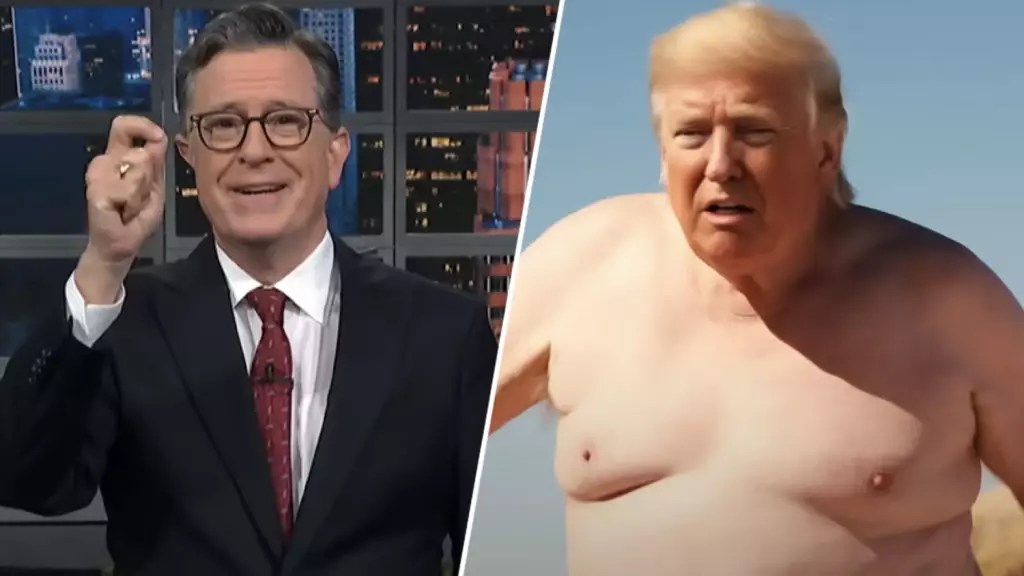In an era increasingly dominated by polarized discourse and sensationalism, satire remains a vital counterbalance, wielding its sharp wit as a weapon against those wielding power. The recent episodes of South Park and The Late Show with Stephen Colbert exemplify how comedy can serve as both a mirror and a critique of the political landscape, especially when traditional channels of dissent are under threat. Instead of passive entertainment, these programs assert their role as urgent commentaries, challenging authority with humor that is as provocative as it is insightful. Their ability to push boundaries underscores an unsettling truth: in a world where political figures often manipulate perception, satire emerges as one of the few avenues capable of exposing uncomfortable realities.
The Cultural Significance of Creating Controversy
South Park’s daring depiction of Donald Trump—particularly the use of a nude deepfake—represents a deliberate assault on the sanctity often granted to political figures. This form of satire does more than mock; it strips away the veneer of authority and invites audiences to scrutinize the human flaws behind the persona. The creators’ decision to attach a tagline about Trump’s masculinity further satirizes the superficial ways in which political power is often constructed and maintained. Such bold choices reflect a deeper cultural necessity: confronting the absurdity inherent in leadership and the spectacle it creates. When comedy crosses into this territory, it becomes a mirror held up to the flaws, contradictions, and vulnerabilities of those in power.
Artificial Intelligence as the New Battleground
Colbert’s commentary on AI de-regulation and its impact on free expression signals a broader concern. With the government easing restrictions on artificial intelligence, the boundaries of satire and misinformation blur, posing serious challenges to truth and accountability. Colbert’s humorous endorsement of South Park’s nude Trump scene—viewed through the lens of a QR code linking to the scene—serves as both a joke and a statement about the importance of unrestrained creative freedom. In this context, AI isn’t just a technological development; it’s a battleground for the soul of satire. Proper oversight becomes critical, but overly restrictive policies threaten to silence voices that critique and challenge those in power, thus endangering the very essence of free speech.
Media, Power, and Unexpected Alliances
The shifting alliances between entertainment giants and political figures reveal a complex, often troubling narrative. Paramount’s latest dealings—with co-creator Matt Stone and Trey Parker signing a lucrative deal shortly after their pointed critique of Trump—highlight the paradox of art and commerce. On one hand, these creators are provocative dissenters; on the other, they are entrenched in a system that ultimately benefits from the spectacle they criticize. Meanwhile, the cancellation of The Late Show amid a settlement with Trump—viewed by some as a form of political or financial capitulation—raises profound questions about the integrity of media institutions. Is satire still a force for genuine resistance, or has commercial loyalty diluted its potency? The fact that Trump himself celebrates Colbert’s show’s cancellation suggests a new era where satire’s influence is constrained, yet its rebellious spirit refuses to be extinguished.
The Unrelenting Spirit of Satirical Resistance
Despite the mounting challenges, satire’s role as a form of resistance endures. Its ability to combine humor with biting critique empowers audiences to confront uncomfortable truths, fostering critical awareness in a climate where misinformation proliferates. The fierce pushback from figures like Trump—who reacts with mockery and disdain—underscores the threat satire poses to authoritarian tendencies. As creators push boundaries, sometimes risking legal disputes or censorship, the message remains clear: humor is an act of defiance. It reminds us that in the face of the powerful’s attempts to control and silence, laughter remains an indomitable weapon—a declaration that the fight for truth and transparency continues unabated.
The landscape of political satire is a turbulent one, but its resilience reflects a collective desire to question, challenge, and ultimately transform. In an age of rapid technological change and increasingly opaque political motives, humor remains one of our most potent forms of resistance and hope.
